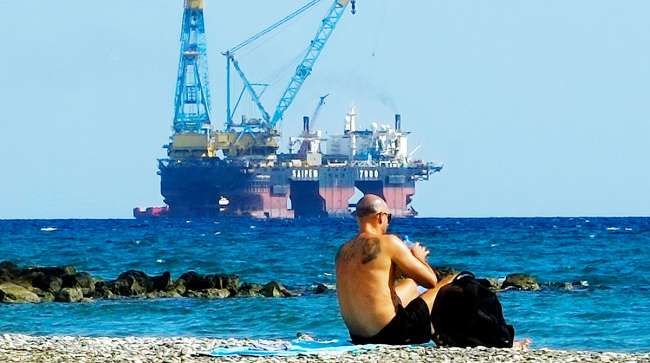Cyprus: ExxonMobil Finds Third-Biggest Gas Deposit in Two Years

NICOSIA, Cyprus — ExxonMobil has made the world’s third-biggest gas find in the past two years off the cost of Cyprus, the country’s government said Feb. 28.
Energy Minister Georgios Lakkotrypis said the discovery of 5 trillion to 8 trillion cubic feet of gas offers hope for more discoveries in waters off the east Mediterranean island nation, which wants to become an alternative energy source for Europe.
RELATED: Diesel Climbs 4.2¢ to $3.048 a Gallon
ExxonMobil Vice President Tristan Aspray said there is potential for more discoveries for ExxonMobil and partners Qatar Petroleum.
“We’d be interested in other opportunities offshore Cyprus and indeed the whole eastern Mediterranean,” Aspray said.

Cyprus Energy Minister Georgios Lakkotrypis (left) and ExxonMobil Vice President Tristan Aspray look each other as they announce the findings of the energy company's exploratory drilling in an area off Cyprus. (Petros Karadjias/AP)
He said ExxonMobil will carry out additional drilling most likely next year.
This is the third gas find in waters that Cyprus has licensed out for exploratory drilling to companies including Italy’s Eni and France’s Total.
A year ago, Eni announced the discovery of a potentially sizable gas deposit in an area adjacent to where ExxonMobil has made the discovery.
In 2011, Texas-based Noble Energy discovered a deposit in waters southeast of Cyprus estimated to contain 4.5 trillion cubic feet of gas.
But Turkey strongly objects to gas search off Cyprus, saying it infringes on its rights — as well as those of Turkish Cypriots in the island’s breakaway northern region.
Turkey, which doesn’t recognize Cyprus as a state, claims parts of Cyprus’ offshore exclusive economic zone and says it will carry out drilling of its own soon.
Aspray said his company is aware of the region’s “geopolitical tensions” but remains focused on its work in waters that lie outside the area Turkey claims as its own.




